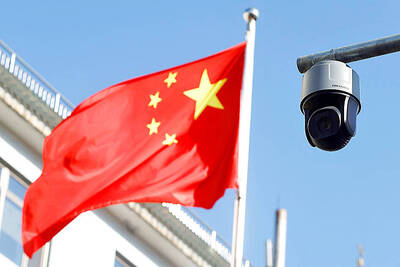The three major political parties should work together to enhance Taiwan’s indigenous weapons programs and implement an all-civilian defense system to deter China, civic organizations and academics said at a news conference at the legislature in Taipei on Thursday.
The outcome of the presidential election on Saturday last week showed that Taiwanese want to remain on the path that President Tsai Ing-wen (蔡英文) treaded for the past eight years of a robust national defense and firmness in dealings with China, while making sure that checks and balances prevent pro-China policies, said Chen Fang-yu (陳方隅), an assistant professor in the Department of Political Science at Soochow University.
By giving the Democratic Progressive Party (DPP) the presidency for a third consecutive term, but denying it a majority in the legislature, “it is clear that people want checks and balances on the government’s executive power,” said Chen, a board member of the Economic Democracy Union.

Photo: Liu Hsin-de, Taipei Times
Taiwan People’s Party (TPP) Chairman Ko Wen-je (柯文哲), who finished third in the presidential race, “did not provide solutions to important issues and government policies, despite his criticism and complaining,” Chen said.
However, “the TPP received higher-than-expected support, possibly because voters wanted an outlet for societal grievances, so the DPP government should strive to deal with those issues, which include low wages, high housing prices, insufficent social welfare support and the difficulties small businesses face in the post-COVID-19 pandemic era,” he said.
Taiwan Citizen Front member Chen Chun-hung (陳俊宏) said that just because the electorate reined in the DPP in the legislature, it did not seek a return of the “black gold” politics of local factions linked to gangster elements that gain wealth from unscrupulous business dealings.
“Nor do people want a return to authoritarianism,” Chen Chun-hung said.
However, a significant number of the Chinese Nationalist Party (KMT) candidates who won are from local factions, so there is concern about their influence on local politics,” he said.
“There is a lot of concern that these legislators would leverage a blue-white legislative alliance to siphon off more government funds for their own use as they scrutinize budgets and consider bills,” he said. “We urge legislators from the three major parties to safeguard Taiwan’s democracy and not return to the old ways.”
“President-elect William Lai (賴清德) must remember that there is an urgent need to enhance indigenous defense weapons production and implement an all-civilian defense system,” Chen Chun-hung said.
Proposed legislation should not be delayed because there is no agreement between the parties, he said, adding that lawmakers should be clear and rational in their legislative discussions and with the public to foster consensus on important bills.
Economic Democracy Union convener Lai Chung-chiang (賴中強) said that the DPP must learn to deal with its lack of a legislative majority, and improve its engagement and dialogue with society.
William Lai must take the lead in these efforts, Lai Chung-chiang said.
“William Lai should convene townhalls and take suggestions from civil groups,” he said, adding that Taiwan Citizen Front and the Economic Democracy Union have tendered a “2024 Citizens’ Political Platform,” providing recommendations to deal with four major societal grievances.
“The KMT still does not identify with Taiwan as a political entity founded on the will of its 23 million people,” he said, adding that the consensus was for democracy, freedom and national sovereignty.
“Deficienicies in the KMT’s charter open the door for China, with Beijing’s influence a factor in Taiwan’s elections,” Lai Chung-chiang said. “This means cross-strait issues dominate, taking precedence over social and economic issues.”
“Taiwan cannot move forward on its democratic path under such conditions,” he said.
“Taiwan must establish a healthy political system with unity among the parties when facing threats from outside or within,” he added.
To reach this goal, we must push reform of local governance, which should have proportional representation, he said.
“That would grant smaller parties a fairer environment to air their policy ideas,” he added.

POLAM KOPITIAM CASE: Of the two people still in hospital, one has undergone a liver transplant and is improving, while the other is being evaluated for a liver transplant A fourth person has died from bongkrek acid poisoning linked to the Polam Kopitiam (寶林茶室) restaurant in Taipei’s Far Eastern Sogo Xinyi A13 Department Store, the Ministry of Health and Welfare said yesterday, as two other people remain seriously ill in hospital. The first death was reported on March 24. The man had been 39 years old and had eaten at the restaurant on March 22. As more cases of suspected food poisoning involving people who had eaten at the restaurant were reported by hospitals on March 26, the ministry and the Taipei Department of Health launched an investigation. The Food and

The long-awaited Taichung aquarium is expected to open next year after more than a decade of development. The building in Cingshui District (清水) is to feature a large ocean aquarium on the first floor, coral display area on the second floor, a jellyfish tank and Dajia River (大甲溪) basin display on the third, a river estuary display and restaurant on the fourth, and a cafe and garden on the fifth. As it is near Wuci Fishing Port (梧棲漁港), many are expecting the opening of the aquarium to bring more tourism to the harbor. Speaking at the city council on Monday, Taichung City Councilor

A fourth person has died in a food poisoning outbreak linked to the Xinyi (信義) branch of Malaysian restaurant chain Polam Kopitiam (寶林茶室) in Taipei, Deputy Minister of Health and Welfare Victor Wang (王必勝) said on Monday. It was the second fatality in three days, after another was announced on Saturday. The 40-year-old woman experienced multiple organ failure in the early hours on Monday, and the family decided not to undergo emergency resuscitation, Wang said. She initially showed signs of improvement after seeking medical treatment for nausea, vomiting and diarrhea, but her condition worsened due to an infection, he said. Two others who

Taiwanese should be mindful when visiting China, as Beijing in July is likely to tighten the implementation of policies on national security following the introduction of two regulations, a researcher said on Saturday. China on Friday unveiled the regulations governing the law enforcement and judicial activities of national security agencies. They would help crack down on “illegal” and “criminal” activities that Beijing considers to be endangering national security, according to reports by China’s state media. The definition of what constitutes a national security threat in China is vague, Taiwan Thinktank researcher Wu Se-chih (吳瑟致) said. The two procedural regulations are to provide Chinese